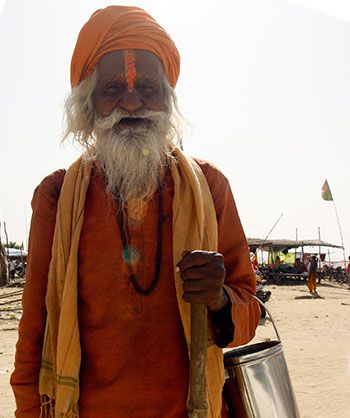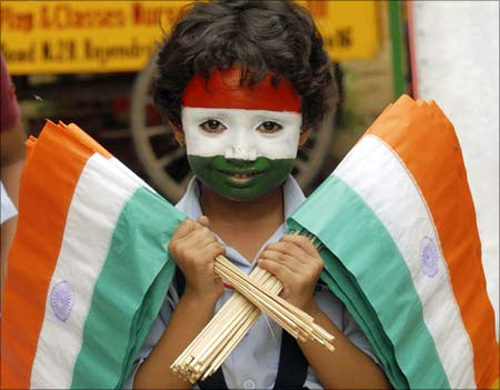
'While India's 'secularism' is a matter of cultural values rooted in Hinduism, the Western concept became one of rights rooted in legal rights.'
'India would be secular with or without Article 25 of the Constitution,' says T V R Shenoy.
What is the Sanskrit word for 'blasphemy'?
The answer, one would think, should be in the Monier Williams Sanskrit-English Dictionary. The lexicon has been one of the acknowledged tools of the trade since it was first published in 1872.
Drawing upon literally hundreds of Sanskrit works -- Jain and Buddhist as well as Hindu, Susruta and Aryabhata alongside Vyasa and Valmiki -- it is now available online courtesy of the University of Cologne and Brown University.
A collaboration between German and American universities to digitise a British work on an Indian language -- it epitomises the Age of the Internet.
Pointing my browser to here (external link) I looked up the word 'blasphemy'.
This is what the search engine turned up: 'No matches found for blasphemy.'
We do need to distinguish between 'blasphemy' and 'heresy', words that are carelessly interchanged but which have very different meanings.
'Heresy' -- to quote the Oxford English Dictionary -- is the act of holding an 'opinion contrary to orthodox or accepted doctrine', and originates in the Greek for 'choice'.
'Blasphemy' is to 'abuse' or 'speak irreverently of something held to be sacred', and its root is the Greek for 'evil-speaking'. There are obvious differences between the terms.
In fact, they work as much in the sphere of politics as of religion. The CPI and the CPI-M spent almost a decade-and-a-half accusing each of heresy; the CPI-M refused to accept the CPI into the Left Front fold until it admitted its errors at the Bhatinda session of 1977, a ritual that strongly resembled doing penance.
'Heresy' is definitely present in the broad stream of Indian thought. If anything the Hindi equivalent ( ) is a better reflection of the Greek root, as it deals with a choice or personal opinion ( ).
'Blasphemy', however, is a totally alien concept. Differences of thought definitely existed in ancient India, but the practice was to voice an opinion without speaking evil of another's choice. Which is to say that you were expected not just to 'tolerate' another's opinion but to 'respect' his or her choice.
Much of this could be simply an accident of history. What we call 'Hinduism' came into existence, and evolved, at a point in time when it was not really in contact with competing faiths.
The Buddha preached moderation in all matters, and the Jain tradition was to renounce violence of all kinds. This was not the ground where the concept of 'blasphemy' could arise.
It was a different tale in West Asia, where the three great Abrahamic religions were born. There was no room for tolerance, leave alone respect, when a faith was (often literally) battling for survival. And so, almost inevitably, heretics and blasphemers alike started to pay with their lives.
As between Christianity and Islam the latter was actually far more tolerant for a long period of time. The Ottoman Empire had Orthodox and Catholic subjects while simultaneously hosting Protestant merchants from elsewhere at a point in time when all three sects were routinely burning each other for heresy.
When Spain expelled the Jews Sultan Suleiman welcomed them to his realm, wondering how any monarch could rid himself of so intelligent and industrious a people.
Christianity's great dividing line is the Era of Enlightenment in the 18th century, which is when many of the 'secular' values of today came into vogue.
There were, however, two crucial differences between the Indian definition of 'secularism' and those that developed in Europe and America.
First, where India talked -- still talks -- of 'respect' the Western ethos spoke of 'tolerance'.
Second, while India's 'secularism' is a matter of cultural values rooted -- let us make no bones about this -- in Hinduism, the Western concept became one of rights rooted in legal rights.
India would be secular with or without Article 25 of the Constitution.
One of the effects of erecting a wall between Church and State is that the right to blaspheme -- to speak evil of -- religion became an entrenched legal right.
Charlie Hebdo may be in the news today because of mocking figures dear to Muslims, but the magazine actually has a history of making fun of all religions.
But does the right to blaspheme automatically become a duty to blaspheme?
That is an easy question to answer. No, obviously not.
Here is a tougher question. Is the freedom of expression an absolute right?
In the wake of the Charlie Hebdo murders no less than Pope Francis weighed in.
'If my good friend speaks badly of my mother, he can expect to get punched.' Then, in a more serious vein, the head of the Roman Catholic Church added that religions had to be treated with respect. 'You cannot provoke. You cannot insult the faith of others. You cannot make fun of the faith of others. There is a limit.'
Assuming the Pope genuinely meant all this, Christianity has come closer to the Indian tradition, speaking not of tolerance -- one 'tolerates' a child's antics, doesn't one? -- but of respect for the faith of others.
This will make a lot of people uncomfortable, but 'faith' encompasses many beliefs. In the wake of the murder of their colleagues, the surviving staff of Charlie Hebdo reiterated their 'faith' in the values underpinning the French republic, one of which is the right to mock religion.
Hinduism, and other Indic religions, simply never developed a concept of blasphemy. Judaism and Christianity, both of which once embraced blasphemy as an article of faith, chose to walk away from it.
One of the great questions of our time is what answer Islam shall develop.
Will it be the mutual respect that India chose, and which the Pope now advocates?
Will it be the indifference of Europe and America?
Or will the answer be yet more conflict?
Image: A sadhu at the Sangam in Allahabad. Photograph: Rajesh Karkera/Rediff.com











 © 2025
© 2025